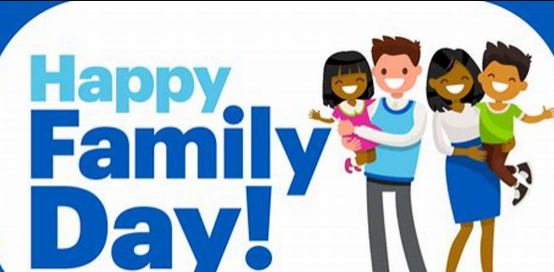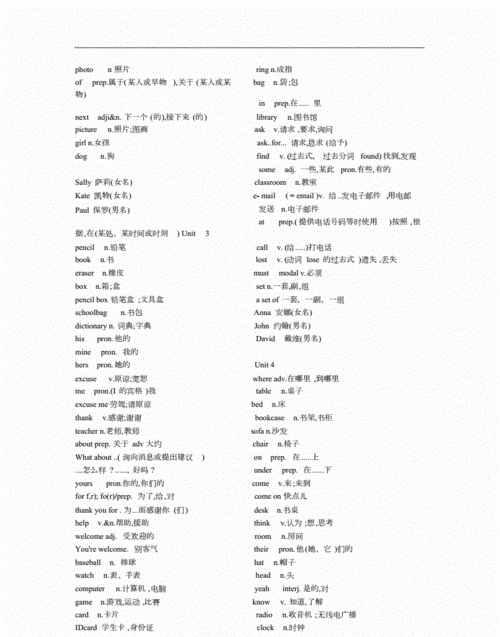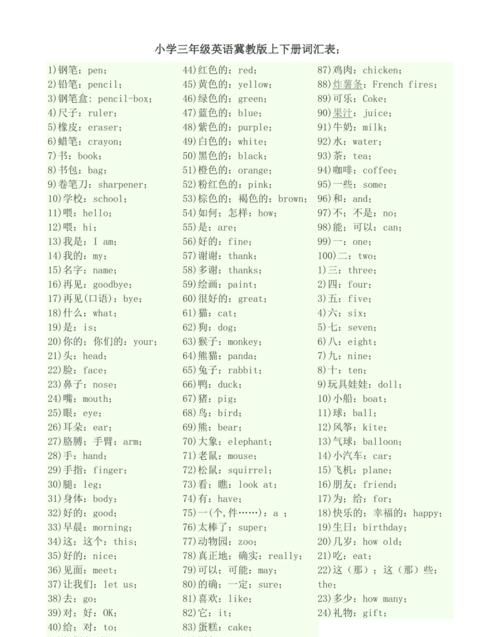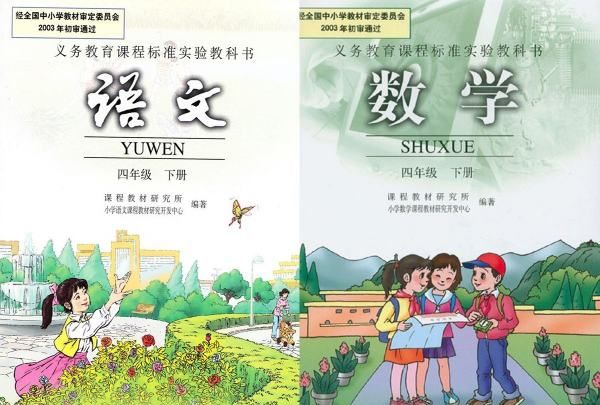本文目录
3一6年级英语单词分类上下册
3一6年级英语单词分类有如下:
1、学习用品:pen钢笔、pencil铅笔、ruler尺子、bag包、eraser橡皮、notebook笔记本。
2、人体:foot脚、head头、face脸、hair头发、nose鼻子、mouth嘴、eye眼睛、ear耳朵。
3、颜色:red红、blue蓝、yellow黄、green绿、white白、black黑、pin**红、black黑。

4、动物:cat猫、dog狗、pig猪、duck鸭、rabbit兔、horse马、elephant大象、fish鱼、bird鸟。
5、人物:friend朋友、boy男孩、girl女孩、mother母亲、father父亲、sister姐妹、brother兄弟。
6、食品:rice米饭、bread面包、milk牛奶、water水、egg蛋、cake蛋糕、COOKIE曲奇、meat肉。
3到6年级衣服类的单词
小学阶段三至六年级英语单词基础性较强。如果按照词性来区分,主要有以下几类。
一,名词。cake,apple,banana,desk等。
二,动词。eat,have,look, watch,run,jump等。
三,形容词。interesting,happy,nice,fast, sunny,beautiful等。
四,副词。fast,quickly,slowly。
五,数词。one,two,three,first,second,third等。
六,代词。this, that, it,they,us,theirs等。
(如扰,勿怪)

三到六年级的英语单词人教版
人教版小学英语·三年级上册·单词表
Unit 1
pen [pen]钢笔 pencil ['pensəl]铅笔 pencil-case ['pensəlkeis]铅笔盒
ruler ['ru:lə]尺子 eraser [i'reizə]橡皮 crayon ['kreiən]蜡笔 book [buk]书
bag [bæɡ]书包 sharpener['ʃɑ:pənə]卷笔刀 school [sku:l]学校
Unit 2
head[hed]头 face[feis] 脸 nose[nəuz] 鼻子 mouth ]mauθ]嘴
eye [ai]眼睛 ear [iə]耳朵 arm[ɑ:m] 胳膊 finger['fiŋɡə] 手指
leg [leɡ]腿 foot [fut]脚 body ['bɔdi]身体
Unit 3
red [red]红色的 yellow ['jeləu]黄色的 green [ɡri:n]绿色的 blue [blu:]蓝色的 purple ['pə:pl] 紫色的 white [hwait] 白色的 black [blæk]黑色的 orange ['ɔrindʒ] 橙色的
pink [piŋk]粉色的 brown [braun]棕色的
Unit 4
cat [kæt] 猫 dog [dɔɡ, dɔ:ɡ]狗 monkey ['mʌŋki]猴子 panda ['pændə]熊猫
rabbit ['ræbit]兔子 duck dʌk] 鸭子 pig [piɡ]猪 bird [bə:d]鸟
bear [bεə]熊 elephant ['elifənt]大象 mouse ]maus, mauz]老鼠 squirrel ['skwə:rəl]松鼠
Unit 5
cake [keik] 蛋糕 bread [bred]面包 hot dog 热狗 hamburger ['hæmbə:ɡə]汉堡包
chicken ['tʃikin]鸡肉 French [frentʃ] Fries 榨薯条 Coke [kəuk] 可乐
juice [dʒu:s] 果汁 milk[milk]牛奶 water['wɔ:tə] 水 tea[ti:]茶 coffee ['kɔfi]咖啡
Unit 6
one [wʌn]一 two [tu:]二 three[θri:] 三 four [fɔ:]四 five [faiv] 五
six[siks] 六 seven['sevən] 七 eight [eit]八 nine[nain] 九 ten[ten]十
doll [dɔl]玩具娃娃 boat [bəut]小船 ball [bɔ:l]球 kite[kait] 风筝
balloon ]bə'lu:n] 气球 car [kɑ:]小汽车 plane [plein] 飞机
人教版小学英语·三年级下册·单词表
Unit 1
boy [bɔi]男孩 girl [ɡə:l] 女孩 teacher ['ti:tʃə] 教师 student ['stju:dənt]学生
this [ðis, 弱ðəs] 这个 my 我的 friend [frend] 朋友 I’m=I am 我是
nice [nais]好的;愉快的 good morning ['mɔ:niŋ] 早上好
good afternoon [,ɑ:ftə:'nu:n]" 下午好 meet [mi:t]遇见;碰见
goodbye [,ɡud'bai] 再见 too [tu:] 也;太
Unit 2
father ['fɑ:ðə] 父亲;爸爸 dad 爸爸口语 mother ['mʌðə]母亲;妈妈
mom 妈妈口语 man [mæn] 男人 woman ['wumən]女人
grandmother ['ɡrænd,mʌðə] 外 祖母 grandma ['ɡrændmɑ:](口语(外)祖母
grandfather ['ɡrænd,fɑ:ðə](外)祖父 grandpa ['ɡrændpɑ:](口语(外)祖父
sister ['sistə] 姐妹 brother ['brʌðə] 兄妹 let’s=let[let] us [ʌs] 让我们 great [ɡreit] 太好了 really ['riəli,'ri:li] 真地;确切地 and ænd, 和;并且 how [hau] 多么;怎么样
Unit 3
eleven [i'levən]十一 twelve[twelv] 十二 thirteen 'θə:'ti:n]十三 fourteen ['fɔ:'ti:n]十四
fifteen ['fifti:n]十五 sixteen['siks'ti:n] 十六 seventeen [,sevən'ti:n] 十七
eighteen['ei'ti:n] 十八 nineteen[,nain'ti:n] 十九 twenty ['twenti] 二十
how [hau] many ['meni]多少 can [kæn, kən] 能够;可以 look [luk] at [强æt, 弱ət]看;瞧
Unit 4
peach [pi:tʃ]桃 pear [pεə]梨 orange ['ɔrindʒ] 橙子 watermelon ['wɔ:təmelən]西瓜
apple ['æpl] 苹果 banana [bə'nɑ:nə] 香蕉 strawberry ['strɔ:bəri]草莓
grape [ɡreip]葡萄 like [laik]喜欢 some [sʌm, 一些;某些 thanks 多谢
Unit 5
bus [bʌs]公共汽车 bike [baik] 自行车 taxi ['tæksi] 出租车 jeep [dʒi:p]吉普车
desk [desk]课桌 chair [tʃεə]椅子 Walkman 随身听 lamp [læmp]台灯
your [jɔ:, jəu, 弱jə] 你的;你们的 zoo [zu:] 动物园
Unit 6
small [smɔ:l] 小的 big [biɡ]大的 long [lɔŋ, lɔ:ŋ] 长的 short [ʃɔ:t] 短的;矮的
tall [tɔ:l] 高的 giraffe [dʒi'rɑ:f] 长颈鹿 deer [diə] 鹿
人教版小学英语·四年级上册·单词表
Unit 1
window:['windəu] 窗户 board:[bɔ:d] 木板 light:[lait] 光线 picture:['piktʃə] 画
door:[dɔ:] 门 floor:[flɔ:] 地板 classroom:['klɑ:srum] 教室
many:['meni] 许多的 our:['auə] 我们的 classmate:['klɑ:smeit] 同学
seat:[si:t] 座位 near:[niə] 近的 what:[hwɔt] 什么
in:[in] 在...里 the:[ðə] 这(个),那(个 we:[wi:] 我们
have:[hæv] 有,拥有 new:[nju:] 新的;新鲜的;新型的 go:[gəu] 去;离去
where:[hwɛə] 在哪里 computer:[kəm'pju:tə] 电脑,电子计算机
wall:[wɔ:l] 墙 fan:[fæn] 扇子 clean:[kli:n] 清洁的 you:[ju:] 你;你们
see:[si:] 看见 me:[mi:] 我 look at:[luk] [æt] 看 room [ru:m] 房间
Unit2
Chinese book:['tʃai'ni:z][buk] 语文书 English book:['iŋgliʃ] [buk] 英语书
mathbook [mæθ] [buk] 数学书 schoolbag[sku:lbæg] 书包
storybook [stɔ:ribuk] 故事书,小说 notebook [nəutbuk]笔记簿
table[teibl] 桌子 colour [kʌlə] 彩色 fat [fæt] 胖的 sofa [səufə] 沙发
shelf [ʃelf] 架子 key [ki:]钥匙 may [mei] 可以 sure [ʃuə] 当然
bag [bæɡ] 袋, 包 pencil[pensəl铅笔 pen [pen] 笔 twenty-one[twenti:wʌn, twʌn-] 二十一
thirty [θɜ:ti:] 三十 forty [fɔ:ti:] 四十 fifty [fɪfti:,fɪfti] 五十 heavy [hevi] 重的
sorry [sɔri] 对不起 sorry [sɔri] 对不起 book [buk] 书 ruler [ru:lə] 尺
Unit 3
thin [θin] 瘦的 strong [strɔŋ] 强壮的 quiet [kwaiət] 安静的 friend [frend] 朋友
Chinese [tʃaɪni:z, -ni:s] 中国的 like [laik] 喜欢 his [hiz, ɪz] 他的
photo [fəutəu] 照片 has [hæz] 有 name [neim] 名字 he [hi: 他
teacher [ti:tʃə,tiːtʃə(r)] 教师 student [stju:dənt]学生 music [mju:zik] 音乐
science [saiəns] 科学 sport [spɔ:t] 运动 right [rait] 正确的
boy [bɔi] 男孩 girl [ɡə:l] 女孩
Unit 4
study [stʌdi] 学习 bathroom [bɑ:θrum] 浴室 bedroom [bedru:m,-rʊm] 卧室
kitchen [kitʃin] 厨房 fish [fiʃ] 鱼 here [hiə] 在这里 home [həum] 家
room [ru:m] 房间 school [sku:l] 学校 phone [fəun] 电话 bed [bed] 床,
sofa [səufə] 沙发 shelf [ʃelf] 架子 fridge [fridʒ] 冰箱 table [teibl] 桌子
they [ðei, ðe] 他[她, 它]们 key [ki:]钥匙 open [əupən]开着的 please [pli:z]请
on [ɔn]在…上 no [nəu]不, 不是 desk [desk]书桌 door [dɔ:]门
chair [tʃɛə,tʃeə(r)]椅子 bed [bed]床
Unit5
rice [rais] 大米 fish [fiʃ] 鱼 noodle [nu:dl]面条 beef [bi:f]牛肉
vegetable [vedʒitəbl]蔬菜 soup [su:p]汤 have [hæv, həv, əv,v]吃 dinner [dinə]晚餐 wait [weit]等 bread [bred]面包 milk [milk]牛奶 egg [eɡ]蛋 water [wɔ:tə]水 hungry [hʌŋɡri]饥饿的 for [fɔ:, fə]为,给 knife [naif]刀 chopstick [tʃɔpstɪk]筷子 spoon [spu:n]勺子 plate [pleit]盘子 fork [fɔ:k]叉子 help [help]帮助
pass [pɑ:s]传递 ready [redi]准备好了 try [trai]尝试 show [ʃəu]展示
yummy [jʌmi]好吃的 food [fu:d]食物 use [ju:z]使用 chicken [tʃikin]鸡肉 fish [fiʃ]鱼
Unit6
family [fæmili]家庭 parent [pɛərənt,peərənt]父母 uncle [ʌŋkl]舅舅 aunt[ɑ:nt]姑姑
baby [beibi]婴儿 people [pi:pl]人 member [membə]成员 only [əunli]仅仅
puppy [pʌpi]小狗 gee [dʒi:]用以表示惊奇、赞赏等 come [kʌm]来 who [hu:, hu]谁
sister [sistə]姐妹 brother [brʌðə]兄弟 father [fɑ:ðə]父亲 mother [mʌðə]母亲
driver [draivə]司机 doctor [dɔktə]医生 farmer [fɑ:mə]农民 nurse [nə:s]护士
young [jʌŋ]年轻的
人教版小学英语·四年级下册·单词表
Unit1
playground ['pleiɡraund] 操场 garden ['ɡɑ:dn] 花园 office ['ɔfis] 办公室
teacher,s-office ['ɔfis] 教师办公室 library [ 'laibrəri ] 图书馆 canteen [ kæn'ti:n ] 食堂
first [ fə:st ] 第一 floor [ flɔ: (r)] 层(楼) welcome [ 'welkəm ] 欢迎 to给,对
our [ 'auə ] 我们的 many [ 'meni ]许多的 visitor [ 'vizitə ] 客人;参观者
there [ ðεə ] 哪儿;那里 class [ klɑ:s]班级;课程 lunch [ lʌntʃ ] 午餐 at 在
this way [ wei ] 这边 please [ pli:z ] 请 beautiful [ 'bju:tiful ]美丽的
computer [ kəm'pju:tə ] 计算机 board [ bɔ:d ]写字板 fan [ fæn ]扇子;电扇
light ['lait ]灯 this [ðis] 这,这个 is 是 my [maɪ] 我的 that [ðæt] 那;那个
your 你的 art [ɑ:t] 绘画;艺术;美术 art room [ɑ:t][ru:m] 绘画教室
computer [ kəm'pju:tə] 计算机;电脑 computer room 计算机教室
washroom ['wɔʃrum] 卫生间 music ['mju:zik] 音乐 music room ['mju:zik] [ru:m] 音乐教室
gym [ dʒim ] 体育馆 TV room电视机房 second [ 'sekənd ] 第二
cool [ ku: ] 订好的;酷的 teacher,s desk[desk ]讲台 picture[ 'piktʃə ]图画 .
wall[ wɔ:l ]墙 floor[ flɔ: ] 地板 yes [ jes ] 是的 it [ it ] 它
Unit2
English [ 'iŋgliʃ ]英语;英文 English class英语课 class [ klɑ:s ] 课
music class [ klɑ:s ] 音乐课 P.E. class体育课 breakfast [ 'brekfəst ] 早餐
dinner [ 'dinə ] 晚餐;正餐. over [ 'əuvə ] 结束 go [ gəu ]去
go to theplayground [ 'pleiɡraund ]去操场 go home [ həum ] 回家
now[ nau ]现在 just a minute ['minit] 再多一会 kid [ kid ] 小孩;孩子
run [ rʌn ] 跑 one[ wʌn ]一 two[ tu: ] 二 three [ θri: ]三
four [ fɔ: ]四 five[ faiv ]五 six[ siks ] 六. seven[ 'sevən ]七
eight[ eit ] 八. nine[ nain ] 九. ten[ ten ]十 what[ wɔt]什么
time [taɪm] 时间 it’s = it is o’clock [ə’klɔk] ……点钟
get [ ɡet ] 得到获得 get up [ ɡet ] [ ʌp ] 起床 go to school [sku:l] 上学
go home 回家 go to bed上床睡觉 ready [ 'redi ] 准备好的
hurry [ 'hʌri ] 抓紧;赶快 math [ mæθ ] 数学
Chinese ['tʃai'ni:z] n 语文,汉语;中国人adj中国的,中国人的;中国话的
china ['tʃainə] n 中国;瓷器 English [ 'iŋgliʃ ] a英国的;英国人的;英语的n英语;英国人
England ['iŋglənd] n英格兰;英国 P.E.体育 music [ 'mju:zik ] 音乐
for [ fɔ ] 为;给 class [ klɑ:s] 班级;课程
Unit3
jacket [ 'dʒækit ] 夹克衫 shirt [ ʃə:t ] 衬衫 skirt [ skə:t ] 裙子 dress [ dres ] 连衣裙
sweater [ 'swetə ] 毛衣 T-shirt T恤衫 whose [ hu:z ] 谁的 red [ red ] 红色的
blue [ blu: ] 蓝色的 yellow [ 'jeləu ] 黄色的 green [ ɡri:n] 绿色的
green beans [gri:n][bi:ns] 绿豆 white [ hwait ] 白色的 no [nəu] 不;不是
not [ nɔt ] 不;不是的 jeans [dʒi:nz] 牛仔裤 pants [ pænts ] 长裤
parents ['pɛərənts] 父母亲 socks [sɔks] 袜子 shoes [ʃuːz] 鞋子
shorts [ʃɔ:ts] 短裤 these [ ði:z ] 这些 so [ 'səu] 如此;那样 they’re = they are
those [ ðəuz ] 那些 but [ bʌt ] 但是 what for [ wɔt ] 为什么
neighbour [ 'neibə ] 邻居 colour [ 'kʌlə ] 颜色
Unit4
warm [ wɔ:m ] 暖和的 cold [ kəuld ] 寒冷的 cool [ ku:l ] 凉爽的;酷的 hot [ hɔt ] 炎热的
weather [ 'weðə ]天气 weather report [ ri'pɔ:t ] 天气预报 wear [ wεə ] v. 穿
today [tə'dei ] 今天 can’t = can not put on穿上
put on 动词,表示穿上衣服的动词,强调动作./例: I get up and put on my coat
wear 动词,表示穿上衣服的动作,也可表示穿着衣服的状态,强调状态./例: Today, he wears a red hat jeans [dʒi:nz] 牛仔裤 pants [ pænts ] 长裤 socks [sɔks] 袜子
shoes [ʃuːz] 鞋子 let’s = let us play [ plei ] 玩,踢 football ['futbɔ:l] 足球
rainy [ 'reini ] 下雨的 rain [ rein ] n雨vi下雨 snowy [ 'snəui ] 下雪的
snow [ snəu ] n雪;vi下雪 now [ nau ] 现在 windy [ 'windi ] 有风的 wind [ wind ] n风
cloudy [ 'klaudi ] 多云的 cloud [ klaud ] 云 sunny [ 'sʌni ] 晴朗的 sun [ sʌn ] 太阳
hello [hə'ləu] 喂,你好(打电话用语) hi [ hai ] 喂,你 not much [ mʌtʃ ] 没什么
New York纽约 matter [ 'mætə ] 事情;麻烦 have to必须;不得不
close [ kləuz ] 关;关上 bye [ bai ] 再见(口语)
Unit5
colourful ['kʌləful ] 色彩丰富的 pretty [ 'priti ] 漂亮的;可爱的 cheap [ tʃi:p ] 便宜的
expensive [iks'pensiv] 昂贵的 sixty [ 'siksti(:) ] 六十 seventy [ 'sevənti ] 七十
hundred [ 'hʌndrəd ] 百 assistant [ə'sistənt] 售货员 help [help] 帮助
how much多少钱 ninety-nine [ 'nainti ] 九十九 that’s = that is
big [ biɡ ] 大的 small [ smɔ:l ] 小的 long [ lɔŋ ] 长的 short [ ʃɔ:t ] 短的;矮的
sneakers ['sni:kəz] 胶底帆布鞋;网球鞋 slippers ['slipə] 拖鞋 sandals ['sandl] 凉鞋
boots [ bu:ts ] 靴子 want [ wɔnt ] 想要 pair [ pεə ] 一双;一对 a pair of一双
for for [fɔ: (r)] [ fɔ(r)] 为;给 son [ sʌn ] 儿子 sun [ sʌn ] 太阳 size [ saiz ] 尺码
all right[ ɔ:l ][rait]好吧;好的 we’ll=we will take[ teik ] 买 them [ ðem ]它(他、她)们
apple [ 'æpl ]苹果 banana[ bə'nɑ:nə ]香蕉 pear [pe ə(r) ] 梨 Orange [ 'ɔrindʒ] 橙子
watermelon ['wɔ:təmelən] 西瓜 are [ɑ:(r)] 是 they [ ðei ] pron. 他(她,它)们
Unit6
sheep [ ʃip ] 绵羊 horse [ hɔ:s ] 马 hen [ hen ] 母鸡 lamb [ læm ] 小羊;羔羊
goat [ ɡəut ] 山羊 cow [ kau ] 奶牛 farm [ fɑ:m ] . n. 农场,农田
farmer ['fɑ:mə] n. 农夫,农民 aren’t =are not donkey [ 'dɔŋki ] 驴子
key [ ki: ] 钥匙 fat [ fæt ] 胖的 cat ['kæt ] 猫 rabbit [ 'ræbit ] 兔子
pig [ piɡ ] 猪 duck [ dʌk ] 鸭子 dog [dɔɡ] 狗 tomoto [ tə'ma:təu] 西红柿
cucumber [ 'kju:kʌmbə ] 黄瓜 potato [ pə'teitəu ] 土豆 onion [ 'ʌnjən ] 洋葱
carrot [ 'kærət ] 胡萝卜 fresh [ freʃ ] 新鲜的 eleven [ i'levən ]十一
twelve [ twelv ] 十二 thirteen [ 'θə:'ti:n] 十三 fifteen [ 'fifti:n] 十五
twenty [ 'twenti ]二十 how many 多少 how much 多少
there [ ðεə ] 那儿;那里 there be
(一)单元音(12个)
1、/i:/ me he see tea 2、/ I / it big ship 3、/e/ bed let friend
4、/æ/ cat and apple 5、/ɑ:/ car farm garden 6、/ɔ/ on hot want
7、/ə:/ her birthday 8、/ə / ago teacher doctor 9、/u:/ zoo ruler cool
10、/u / foot good book 11、/ɔ:/ water shortdoor 12、/ ɔ / dog what talk
(二)双元音(8个)
1、/ ei / day eight great 2、/ ai / hi my bye like 3、/ ɔi / boy toy
4、/ əu / no boat know 5、/ au / out now brown 6、/ iə / ear deer near
7、/εə / bear there 8、/ uə / sure poor
/θ/ thirteen 十三[ˌθə:ˈti:n] thank 谢谢[ θæŋk]
/ð/ mother 母亲[ˈmʌðə] father 父亲[ˈfɑ:ðə]

英语人教版三到六年级所有单词
PEP英语三年级(上册)三会单词
Unit 1
pen 钢笔 pencil 铅笔 pencil-case 铅笔盒 ruler 尺子 eraser 橡皮 crayon 蜡笔book 书 bag 书包 sharpener 卷笔刀 school 学校
Unit 2
head 头face 脸nose 鼻子mouth 嘴eye 眼睛ear 耳朵arm 胳膊finger 手指 leg腿foot 脚body 身体
Unit3
red 红色的yellow 黄色的green 绿色的blue 蓝色的 purple 紫色的white 白色的black 黑色的orange 橙色的pink 粉色的brown 棕色的
Unit 4
cat 猫dog 狗monkey 猴子panda 熊猫rabbit 兔子duck 鸭子pig 猪bird 鸟bear 熊elephant 大象mouse 老鼠squirrel 松鼠
Unit 5
cake 蛋糕bread 面包hot dog 热狗hamburger 汉堡包chicken 鸡肉 French fries 榨薯条Coke 可乐juice 果汁milk 牛奶water 水tea 茶coffee 咖啡
Unit 6
one 一two 二three 三four 四five 五six 六seven 七eight 八 nine 九ten 十doll 玩具娃娃boat 小船ball 球kite 风筝 balloon 气球car 小汽车plane 飞机
PEP英语三年级(下册)三会单词
Unit 1
boy 男孩 girl 女孩teacher 教师student 学生this 这个my 我的friend 朋友I’m=I am 我是nice 好的;愉快的good morning 早上好good afternoon 下午好meet 遇见;碰见goodbye 再见too 也;太
Unit 2
father 父亲;爸爸dad 爸爸(口语)mother 母亲;妈妈mom 妈妈(口语)man男人woman 女人grandmother (外)祖母 grandma (口语)(外)祖母grandfather (外)祖父 grandpa (口语)(外)祖父sister 姐妹brother 兄弟
let’s=let us 让我们great 太好了really 真地;确切地and 和;并且how 多么;怎么样
Unit 3
eleven 十一twelve 十二thirteen 十三fourteen 十四fifteen 十五sixteen 十六seventeen 十七eighteen 十八nineteen 十九twenty 二十how many 多少can 能够;可以look at 看;瞧
Unit 4
peach 桃pear 梨orange 橙子watermelon 西瓜apple 苹果
banana 香蕉strawberry 草莓grape 葡萄like 喜欢some 一些;某些thanks 多谢
Unit 5
bus 公共汽车bike 自行车taxi 出租车jeep 吉普车desk 课桌 chair 椅子walkman 随身听lamp 台灯your 你的;你们的 zoo 动物园
Unit 6
small 小的big 大的long 长的short 短的;矮的tall 高的 giraffe 长颈鹿deer 鹿
PEP四年级上册四会单词词汇表
Unit 1
Window(窗户) board(板) light(灯) picture(图片) door(门) floor(地板) classroom (教室) computer(电脑) teacher’desk(讲台) wall(墙) fan(扇子)
Unit 2
bag(包) pencil(铅笔) pen(钢笔) book (书) ruler(尺子) pencil-case(铅笔盒)
Unit 3
teacher(教师) student(学生) boy(男孩) girl(女孩) friend(朋友)
Unit 4
home(家) room(房间) school(学校) classroom(教室) window(窗户) desk(课桌书桌) door(门) chair(椅子) bed(床)
Unit 5
rice(米饭) beef(牛肉) bread(面包) milk(牛奶) egg(蛋) water(水) chicken(鸡肉) fish(鱼)
Unit 6
sister(姐妹) brother(兄弟) father(父亲爸爸) mother(母亲妈妈) driver(司机) doctor(医生) farmer(农民) nurse(护士)
PEP四年级下册四会单词词汇表
Unit 1
computer(计算机) board(写字板) fan(风扇) light(灯) this(这这个) is(是)my(我的) that(那那个) your(你的) teacher’s desk(讲台) picture(图画照片) wall(墙壁) floor(地板) yes(是是的) it(它)
Unit 2
one(一) two(二) three(三) four(四) five(五) six(六) seven(七) eight(八) nine(九) ten(十) what(什么) time(时间) it’s=it is …o’clock(…点钟) math(数学) Chinese(语文) English(英语) P.E.(体育) music(音乐) for(为给) class(课程)
Unit 3
jacket(夹克衫) shirt(衬衫) skirt(裙子) dress(连衣裙) T-shirt(T恤衫) red(红色的) blue(蓝色的) yellow(黄色的) green(绿色的) white(白色的) no(不不是) not(不不是的) colour(颜色)
Unit 4
warm(暖和的) cold(寒冷的) cool(凉爽的) today(今天) jeans(牛仔裤) pants(长裤) socks(袜子) shoes(鞋子) let’s=let us play(玩踢) football(足球) snowy(下雪的) sunny(晴朗的)
Unit 5
how much(多少钱) big(大的) small(小的) long(长的) short(短的) apple(苹果) banana(香蕉) pear(梨) orange(橙子) watermelon(西瓜) are(是) they 它(他、她)们
Unit 6
horse(马) aren’t=are not cat(猫) rabbit(兔子) pig(猪) duck(鸭子) dog(狗) eleven(十一) twelve(十二) thirteen(十三) fifteen(十五) twenty(二十) how many(多少) there(那儿那里)
PEP五年级上册四会单词词汇表
Unit 1
Young (年轻的) funny (滑稽可笑的) tall (高的)
strong (强壮的) kind (和蔼的、亲切的)
old (年老的) short (矮的)thin (瘦的)
Mr (先生) like (像、喜欢) strict (严格的)
smart (聪明的、巧妙的) active (积极的、活跃的)
quiet (安静的、文静的)very (很、非常) but (但是)
Unit 2
Mondy (星期一) Tuesday (星期二) Wednesday (星期三)
Thursday (星期四) Friday (星期五) Saturday (星期六)
Sunday (星期天) day (天) have (有、吃) on (在…..时候)
do homework (做作业) watch TV (看电视) read books (读书)
Unit 3
eggplant (茄子) fish (鱼) green beans (青豆) tofu (豆腐)
potato (土豆) tomato (西红柿) for (为) lunch (中餐)
we (我们) tasty (好吃的) sweet (甜的) sour (酸的)
fresh (新鲜的) salty (咸的) favourite (最喜欢的)
they are (他们是) fruit (水果) grape (葡萄)
Unit 4
Cook the meals (倒垃圾) water the flowers (浇花)
sweep the floor (扫地) clean the bedroom (打扫卧室)
make the bed (铺床) set the table (摆饭桌)
wash the clothes (洗碗碟) do the dishes (收拾衣服)
use a computer (使用计算机
Unit 5
curtain (空调) trash bin (垃圾箱) closet (壁橱)
mirror (镜子) end table (床头柜) bedroom (卧室)
kitchen (厨房) bathroom (卫生间) living room (客厅)
in (在…里面) on (在…上面) under (在…下面) near (在..旁边)
behind (在…后边) clothes (衣服)
Unit 6
river (河流) flower (花) grass (草) lake (湖泊) forest (森林)
path (路) pake (公园) picture (照片) hourse (房子) bridge (桥) tree (树) road (公路) building (建筑物) clean (干净的)
PEP五年级下册四会单词词汇表
Unit 1
do morning exercises(晨练) eat breakfast(吃早饭)
have english class(上英语课) play sports(进行体育运动)
eat dinner(吃晚饭) when(什么时候)
evening(夜晚;晚上) get up(起床)
at(在……点钟) usually(通常;一般) noon(中午)
climb mountains(爬山) go shopping(购物;买东西)
play the piano(弹钢琴) visit grandparents(看望祖父母)
go hiking(去远足) weekend(周末) often(经常) sometimes(有时候)
Unit 2
spring(春天) summer(夏天) fall(秋天) winter(冬天) season季节) which(哪一个) best(最;极) swim(游泳)
fly kites(放风筝) skate(滑冰;滑冰鞋) make a snowman(堆雪人)
plant trees(种树) why(为什么) because(因为) sleep(睡觉)
Unit 3
Jan./January(一月) Feb./February(二月) Mar./March(三月) Apr./April(四月) May(五月) June(六月) July(七月) Aug./Augest(八月) Sept./September(九月) Oct./October(十月) Nov./November(十一月) Dec./December(十二月) birthday(生日) uncle(叔叔;舅舅) her(她的) date(日期)
Unit 4
draw pictures(画画) cook dinner(做饭) read a book(看书)answer the phone(接电话) mom(妈妈) listen to music9(听音乐) clean the room(打扫房间) write a letter(写信)
write an e-mail(写电子邮件) grandpa(爷爷;外公) study(书房)
Unit 5
fly(飞) jump(跳) walk(走) run(跑) swim(游泳)
kangaroo(袋鼠) sleep(睡觉) climb(往上爬) fight(打架)
swing(荡;荡秋千) drink water(喝水)
Unit 6
take pictures(照相) watch insects(观察昆虫) pick up leaves(采摘树叶) do an experiment(做实验) catch butterfly(捉蝴蝶) honey(蜂蜜) count insects(数昆虫) collect leaves(收集树叶) wtite a report(写报告) play chess(下棋) have a picnic(举行野餐)
PEP六年级上册四会单词词汇表
Unit 1
by (经,乘) foot(脚) bike(自行车) bus(公共汽车) train(火车) how(怎样) go to school(上学) traffic(交通) traffic light(交通灯) traffic rule(交通规则) stop(停,停车站)wait(等待) get to(到达)
Unit 2
library(图书馆) post office(邮局) hospital(医院) cinema(电影院) bookstore(书店) where(在哪里,到哪里) please(请) next to(与…相邻) turn(转弯) right (右边) left(左边) straight(成直线地) then (然后)
Unit 3
next week(下周) this morning(今天上午) this afternoon(今天下午) this evening (今天晚上) comic book(漫画书) post card(明信片) newspaper(报纸) buy(购买)
Unit 4
hobby(爱好) ride a bike--riding a bike(骑自行车) dive--diving(跳水) play the violin—playing the violin(拉小提琴) make kites—making kites(制作风筝) collect stamps—collecting stamps(集邮) live –lives(居住) teach--teaches(教) go--goes(去) watch--watches(看) read--reads(读,看) does doesn’t=does not
Unit 5
singer(歌唱家,歌手) writer(作家) actor(男演员) actress(女演员) artist(画家) TV reporter(电视台记者) engineer(工程师) accountant(会计) policeman(男警察) salesperson(销售员) cleaner(清洁工) where(在哪里,到哪里) work(工作)
Unit 6
rain(雨) cloud (云) sun(太阳) stream(河,溪) come from(来自,从…来) seed(种子) soil(土壤) sprout (苗,芽) plant(植物,种植) should (应该) then(然后)
PEP六年级下册四会单词词汇表
Unit 1
tall—taller更高的 short—shorter 更矮的 strong—stronger 更强壮的 old—older 年龄更大的 young—younger 更年轻的 big—bigger 更大的heavy—heavier 更重的 long—longer 更长的 thin—thinner 更瘦的 small—smaller (体型)更小的
Unit 2
have a fever 发烧 have a sore throat喉咙疼 have a cold感冒 have a toothache 牙疼 have a headache 头疼 matter事情,麻烦 sore 疼的 hurt疼痛 nose 鼻子 tired疲劳的,累的 excited兴奋的 angry生气的 happy高兴的 bored无聊的,烦人的 sad 忧伤的,悲伤的
Unit 3
watch—watched 看 wash—washed 洗 clean—cleaned打扫 play—played玩 visit—visited 看望 do—did last weekend 上一个周末 go—went去 go to a park—went to a park 去公园 go swimming—went swimming去游泳 go fishing—went fishing去钓鱼 read—read 读 go hiking—went hiking 去郊游
Unit 4
leran Chinese—learned Chinese学汉语 sing and dance—sang and danced 唱歌和跳舞 eat good food—ate good food吃好吃的食物 take pictures—took pictures 照相 climb—climbed 爬 have—had buy presents—bought presents买礼物 row a boat—rowed a boat 划船 see elephant—saw elephant 看大象 go skiing—went skiing 去滑雪 go ice-skating—went ice-skating 去滑冰 how怎么,如何 get—got 到达 last 上一个的,仅余的,留在最后的
人教版由人民教育出版社出版的图书,一般指教科书,简称为人教版的课本。小学到高中都有这个版本的书。也是大多数学校所用的书。

人民教育出版社(People's Education Press,简称PEP)成立于1950年,其前身是华北联合出版社,上海联合出版社和华北教科书编审委员会,1961年与高教出版社合并,是教育部直属的主要从事基础教育教材和其他各级各类教材、教育图书的研究、编写、出版、发行的专业出版社。毛泽东同志题写了社名。
50多年来,人民教育出版社受教育部委托,主持或参与草拟了2000年以前历次中小学各科教学大纲,由国家颁布;根据我国教育改革发展的需要,先后毛泽东主席亲笔题写的社名,编写、出版了九套全国通用的中小学教材;2014年,人教版第十套教材,即按照教育部新课程标准研究、编写的21世纪义务教育全套新教材正在陆续出版之中,其中一部分已在教育部确定的实验区进行实验。建社至今,累计出版各种出版物万余种,总印数达数百亿册。
以上就是关于3~6基础英语单词 ,3一6年级英语单词分类上下册的全部内容,以及3~6基础英语单词 的相关内容,希望能够帮到您。

